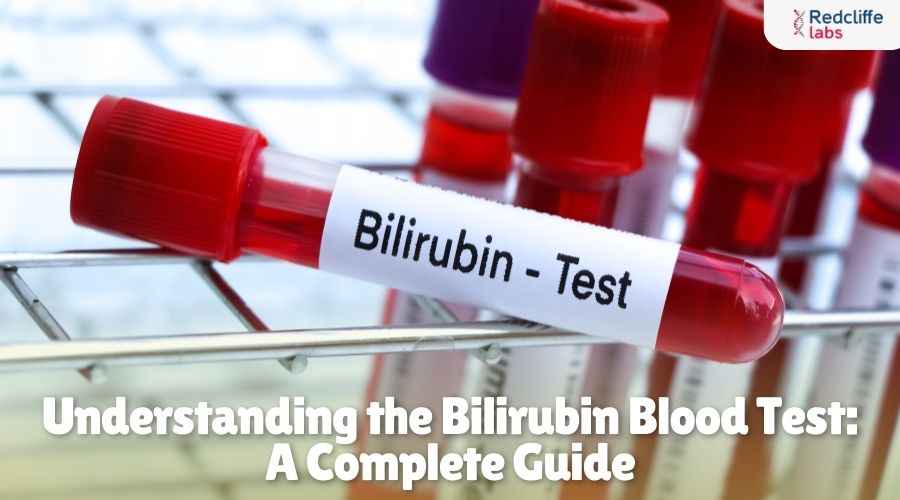Understanding the Bilirubin Blood Test: A Complete Guide

Medically Reviewed By
Prof. Ashok Rattan
Written By Kirti Saxena
on Jan 8, 2025
Last Edit Made By Kirti Saxena
on Jul 19, 2025

Have you ever heard about the bilirubin test? Some of you might already know about the test, but for those who do not know about the bilirubin blood test, the test provides vital information about your liver health.
High bilirubin levels in newborns are natural and temporary. However, high bilirubin in adults could be a sign of certain health conditions, such as jaundice, gallstones, and liver issues.
But what is the term "Bilirubin"?
Bilirubin is a yellow pigment that forms when the body breaks down old red blood cells. Its levels in the blood can provide vital insights into your liver health and overall well-being. A Bilirubin Blood Test is a simple diagnostic test that helps assess bilirubin levels in the blood. In this comprehensive guide, let's explore all aspects of the bilirubin test, including its purpose, significance, normal range, and more.
What is a Bilirubin Blood Test?
A bilirubin test determines the amount of bilirubin levels in the blood. Bilirubin is a yellow pigment produced in the liver when red blood cells (RBCs) break down. Bilirubin is processed by the liver and excreted through bile. High bilirubin concentration indicates liver issues. They can be induced by a faster red blood cell breakdown rate, called hemolysis.
Abnormal levels of bilirubin can indicate issues with the liver, bile ducts, or red blood cell destruction. The test measures two types of bilirubin:
- Direct (conjugated) bilirubin: Processed by the liver and ready for excretion.
- Indirect (unconjugated) bilirubin: Formed during the breakdown of hemoglobin and not yet processed by the liver.
Total bilirubin is the sum of these two forms and is often used to indicate liver function.
Uses of Bilirubin Blood Test
The blood test for bilirubin serves multiple purposes-
- Diagnosing Liver Conditions- The test helps to identify conditions like hepatitis, cirrhosis, or liver damage.
- Assessing Jaundice—The bilirubin blood test helps to diagnose jaundice, which occurs when the eyes and skin turn yellow, gallbladder disease, and hemolytic anemia. The test also helps identify newborns' jaundice, which may lead to kernicterus at very high bilirubin levels.
- Monitoring Liver Function—Regular bilirubin screening helps to monitor disease progression and how the body responds to treatment.
- Detecting Hemolytic Anemia- Identifies increased destruction of red blood cells.
- Evaluating Bile Duct Health- The test helps to detect blockages or issues in the bile ducts.
How Does the Bilirubin Blood Test Work?
The bilirubin blood test is a simple blood test in which the healthcare provider collects a blood sample from the vein of your arm. The sample is then sent to the laboratory for analysis to determine direct, indirect, or total bilirubin levels. Finally, the bilirubin test results are available on the same day or within 10-12 hours of sample collection.
The bilirubin test process involves the following steps:
- Blood Draw- A healthcare provider cleans the arm area and inserts a needle into a vein to collect the blood sample.
- Laboratory Analysis- The sample is processed to measure bilirubin levels.
- Results- The report indicates whether your bilirubin levels are within the normal range or if further investigation is needed.
Normal Range of Bilirubin Levels
Bilirubin levels are measured in milligrams per deciliter (mg/dL). The Bilirubin normal range for adults is as follows:
| Bilirubin Type | Normal Range (mg/dL) |
| Total Bilirubin | 0.1 - 1.2 mg/dL |
| Direct (Conjugated) | 0.0 - 0.3 mg/dL |
| Indirect (Unconjugated) | 0.1 - 0.9 mg/dL |
Higher bilirubin levels (up to 5 mg/dL) in newborns are considered normal due to the immature liver but must be monitored closely to prevent complications.
Also read: Bilirubin Test: Direct vs Indirect, Normal Range Values
Interpreting Bilirubin Levels
High Bilirubin Levels
- Liver Diseases: Conditions like hepatitis, cirrhosis, or liver failure.
- Bile Duct Blockage: Gallstones or tumors obstructing bile flow.
- Hemolytic Anemia: Excessive breakdown of red blood cells.
- Gilbert’s Syndrome: A common, harmless genetic condition.
The reasons behind unconjugated bilirubin in newborns include:
- Premature birth
- Reaction to substances in breast milk
- Blood type mismatch between baby and parents.
Low Bilirubin Levels
Low bilirubin levels are typically not a concern but may indicate an underlying issue like iron deficiency anemia in rare cases.
How to Prepare for the Bilirubin Test?
Preparation required for the bilirubin blood test-
- Fasting- Fasting is not required for the bilirubin test. You can eat and drink normally before the test.
- Medication—If you take any medications or supplements, inform your doctor, as some can affect bilirubin levels.
- Avoid Alcohol- Do not drink alcohol and avoid smoking at least 24 hours before the test.
What Causes High Bilirubin Levels?
Elevated bilirubin levels, also known as hyperbilirubinemia, can occur due to various conditions that affect the breakdown, transport, or elimination of bilirubin. Here are the common causes of high bilirubin levels.
- Liver Diseases- Hepatitis, cirrhosis, or fatty liver disease.
- Bile Duct Obstructions- Gallstones, tumors, or inflammation.
- Hemolytic Anemia- High destruction of red blood cells.
- Inherited Conditions- Gilbert’s syndrome or Crigler-Najjar syndrome.
- Infections- Viral or bacterial infections affecting the liver.
Other reasons why Bilirubin might build-up
- Excessive Red Blood Cell Breakdown- Conditions like hemolytic anemia can rapidly destroy red blood cells, which may cause an overproduction of bilirubin.
- Impaired Liver Function—The liver may struggle to process its normal bilirubin load due to toxic overload or be affected by chronic liver diseases that reduce its efficiency.
- Obstruction in the Biliary System- Blockages in the bile ducts or gallbladder can prevent bile from being cleared effectively and may cause bile to back up and leak into the blood.
Bilirubin Levels in Newborns
A few days after birth, newborns have high bilirubin levels, which causes jaundice. This condition is temporary and resolves on its own within a few weeks.
It happens because the newborns have more red blood cells and break down too fast, but their livers are not developed enough to keep up.
The pregnant woman's liver helps with this task before birth, but only 1% of the liver is active as an adult after birth.
Higher bilirubin levels usually cause jaundice between 1 to 3 days after birth. Bilirubin levels can peak as high as 18 mg/dL on the 4th and 5th day, and jaundice clears up within weeks as the liver matures.
Feeding 8 to 12 times daily helps to promote regular bowel movements, which in turn helps to remove bilirubin from the body.
In case of high bilirubin levels after birth, the doctors may recommend the following treatment options-
- Phototherapy
- Intravenous immunoglobulin treatment
- Exchange transfusion
Read more: Bilirubin Level in Newborn Baby: Physiological vs Pathological Jaundice, Range and More
What causes low bilirubin levels (hyperbilirubinemia)?
Certain medications, such as antibiotics, birth control pills, sleeping pills, and seizure medications, may lower bilirubin levels. However, low bilirubin levels are generally not a cause for concern.
Certain medications, including antibiotics, birth control pills, sleeping pills, and seizure medications, can lower bilirubin levels. Low levels aren't generally a cause for concern.
Who Should Get a Bilirubin Blood Test?
Your doctor may recommend this test if you:
- Show symptoms of jaundice, such as yellowing of the skin or eyes
- Have unexplained fatigue, abdominal pain, or dark urine
- Are undergoing treatment for liver disease
- Have a family history of liver or blood disorders
- Are taking medications that affect the liver
What are the Risks of a Bilirubin Blood Test?
The bilirubin test is generally safe, but it might have minor risks, including:
- Slight pain or bruising
- Risk of infection
- Dizziness or fainting in some individuals
- Hematoma
What is the Price of the Bilirubin Test?
The cost of a bilirubin test may vary depending on the lab, location, and procedure used. On average, the bilirubin test price ranges from INR 199 to 500. At Redcliffe Labs, the Bilirubin test price is INR 199 only. You can book your test online and get it done from the comfort of your home. A wide range of diagnostic tests is available, and you can book and get the best discounts.
Common Symptoms of Abnormal Bilirubin Levels
Common symptoms indicating abnormal bilirubin levels include:
- Yellowing of the skin and eyes (jaundice)
- Dark urine and pale stools
- Fatigue and weakness
- Nausea and vomiting
- Abdominal pain or swelling
- Itchy skin
Also read: High Bilirubin Levels (Hyperbilirubinemia): Symptoms, Causes, Tests, and Treatments
How to Lower High Bilirubin Levels?
Here are some general tips to lower your bilirubin levels-
- Healthy Diet- To control your bilirubin levels, include foods rich in antioxidants, such as fruits and vegetables.
- Hydration- Stay hydrated and drink plenty of water to support liver function.
- Avoid Alcohol- Avoid drinking alcohol and smoking if you have high bilirubin levels, as alcohol stresses the liver.
- Exercise- Move your body daily and follow an active routine.
- Medications- Doctors may prescribe some medications to treat hepatitis or anemia.
- Surgery- This may be needed to remove blockages in the bile duct.
In newborns, doctors may recommend phototherapy to reduce bilirubin levels.
The Key Takeaways
If you notice any unusual symptoms, such as dark-colored urine, fatigue, yellow skin, and eyes, consult your doctor and have a bilirubin test. Your healthcare provider may also recommend the test in case of jaundice. The bilirubin blood test provides critical insights into your liver health.
You can also book your test from Redcliffe Labs. The qualified and professional sample collection experts will come to your home quickly, and you will receive your test reports on time.
FAQs on Bilirubin Blood Test
1. What is the normal range of bilirubin?
The normal bilirubin range in the blood for Total bilirubin is 0.1–1.2 mg/dL for adults and 1 mg/dL for those under 18. For Direct bilirubin, the normal range should be less than 0.3 mg/dL
2. Do I need to fast before the bilirubin blood test?
No, you do not need to fast before the bilirubin test. You can eat normally.
3. What happens during the bilirubin test?
The healthcare provider will take the blood sample from the vein of your arm. You might feel a sting-like pain. The collected sample will be sent to the lab to analyze bilirubin levels.
4. Can vitamins cause high bilirubin?
Yes, some vitamins like Vitamin D, Vitamin B12, and Vitamin A can affect bilirubin levels.
5. How long does the bilirubin level test take?
The bilirubin blood test takes about 5–10 minutes. The test reports will be available within 10-12 hours of sample collection.
6. Can diet affect bilirubin levels?
Yes, fasting or a high-fat diet can temporarily affect bilirubin levels.
7. Is the bilirubin test painful?
No, the bilirubin blood test is simple and generally safe. During sample collection, you might feel a sting-like pain.
8. How often should I get the bilirubin test?
The frequency of your bilirubin test depends on your health condition. However, adults can take the test once or twice a year. Consult your doctor for personalized advice.



